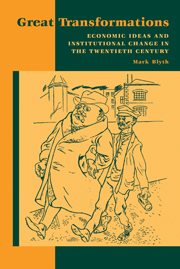Book contents
- Frontmatter
- Contents
- Preface
- Acknowledgments
- PART I THEORY
- PART II CASES
- 3 Building American Embedded Liberalism
- 4 Building Swedish Embedded Liberalism
- 5 Disembedding Liberalism: Ideas to Break a Bargain
- 6 Disembedding Liberalism in the United States
- 7 Disembedding Liberalism in Sweden
- PART III CONCLUSIONS
- Index
7 - Disembedding Liberalism in Sweden
Published online by Cambridge University Press: 05 June 2012
- Frontmatter
- Contents
- Preface
- Acknowledgments
- PART I THEORY
- PART II CASES
- 3 Building American Embedded Liberalism
- 4 Building Swedish Embedded Liberalism
- 5 Disembedding Liberalism: Ideas to Break a Bargain
- 6 Disembedding Liberalism in the United States
- 7 Disembedding Liberalism in Sweden
- PART III CONCLUSIONS
- Index
Summary
The Politicization of Labor
Similar to what occurred in the United States, Swedish embedded liberal institutions both generated and became subject to increasing uncertainty during the late 1960s. What brought Sweden to this point was a combination of three domestic level factors: increasing labor militancy, a turn to legislation rather than negotiation in business-labor relations, and increasing state intervention in the economy. For Swedish business, this combination of factors signaled a clear repudiation of the ideas underpinning Swedish embedded liberalism and served as a focal point for the reemergence of organized business as a political actor. How business used the same ideas we saw in the transformation of the American institutional order to break the institutions of Swedish embedded liberalism is once again the key to understanding institutional change.
A new wave of labor unrest hit Sweden in the late 1960s and early 1970s. In December 1969, a strike at the state-owned iron-ore mine at Leveaniemi spread to other mines in nearby Kiruna and Mamberget. As Peter Swenson notes, “the unofficial and illegal character of the strike was widely interpreted … as a repudiation of the [Landsorganisationen i Sverige] (LO) affiliated Miners' Union and, perhaps just as much, of centralized… control in peak level bargaining.” On the heels of this unrest, the number of wildcat strikes shot up precipitously to over two hundred fifty separate instances during 1970.
Information
- Type
- Chapter
- Information
- Great TransformationsEconomic Ideas and Institutional Change in the Twentieth Century, pp. 202 - 248Publisher: Cambridge University PressPrint publication year: 2002
